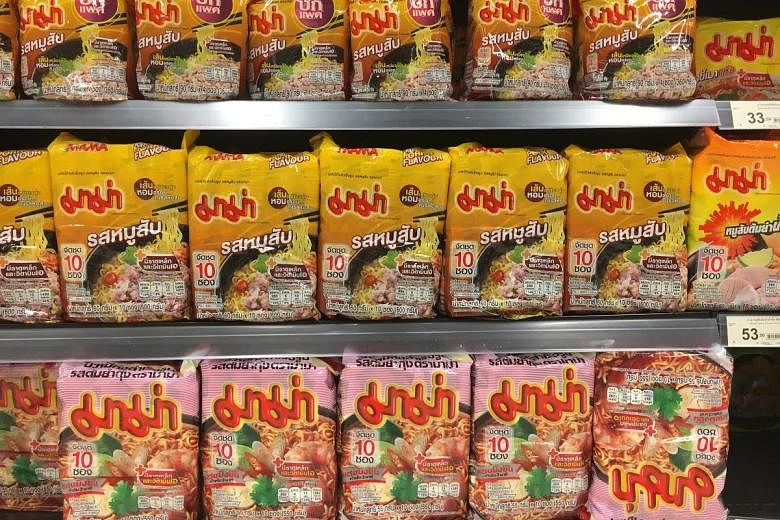BANGKOK - When Ms Mitch Tanalat, 25, first went to Japan in 2013 for her studies, she packed Mama instant noodles in her suitcase.
Four years later, she would still pack the famous Thai noodles every time she prepares for a trip back to Tokyo. She prefers Mama because they are spicy compared to Japanese noodles, and says her favourite flavour is Rice Vermicelli Yen Ta Fo.
Young students like Ms Mitch who leave for studies abroad would pack the noodles for those times they need some comfort food. Other Thai expats would get their noodle fix from Asian stores overseas.
"It's expensive to get them in Japan," Ms Mitch said. If she runs out of stock, she would ask friends travelling to Japan to bring some for her.
It is no exaggeration to say that Thais love their instant noodles. A survey in 2013 showed that Thais gobble 43 packs of instant noodles a year on average.
Mama is the leading brand, capturing more than 50 per cent of the market. Wai Wai is another famous instant noodle brand in the country.
And with globalisation, products like Mama noodles are now available overseas for those expats who long for the taste of home.
Thai President Foods Public Co Ltd, which produces Mama, exports their noodles for distribution through retail chains in the US, Europe, Africa and other parts of Asia.
During the severe floods in Thailand in 2011, instant noodles helped alleviate hunger in communities that could not access fresh food. It's also very affordable with a 60-gram pack of Mama noodles selling for only 6 baht (24 Singapore cents).
The government also controls the price of noodles, making it more difficult for manufacturers to make production changes that would cost money.
"What else can you buy with 6 baht? Even a small bottle of water is more expensive," said Mr Chumpol Temiyasathit, acting RD manager for Thai President Foods.
Mama noodles are even used by hawkers and restaurants, which create dishes around it. Among others, there's yum mama (salad with Mama noodles), and pad mama or good old stir-fried Mama noodles.
Tourists are often surprised to find that there are spicier versions of the instant noodles.
Locals and tourists alike flock to Jeh O Chula restaurant near Chulalongkorn University to sample its famous dish, Mama Tom Yum Seafood, heaped with squid and prawns.
But the market has been the target of recent government efforts to introduce a healthier lifestyle for Thais, who consume over 4,000 milligrams of sodium a day. That's more than double the amount suggested by the World Health Organisation which is 2,000mg or less than one teaspoon per day.
Thailand's health ministry has warned that excessive intake of sodium is dangerous and can lead to many health problems including hypertension, diabetes, heart disease, kidney disease and cancer.
In March, the Thai Food and Drug Administration (FDA) met with related agencies and agreed to regulate the amount of sodium used in the food industry, specifically in the production of frozen food and condiments.
Under its Healthier Choice programme, instant noodles should contain only a gram of sodium or less per 50 grams. A 60-gram of Mama noodles contains 1.61 grams of sodium. This puts manufacturers like Thai President Foods in a quandary, as they fear that changing their recipe might change the taste of their noodles and make them lose customers.
Mr Chumpol said the noodles may end up costing more if the company has to change the recipe, adding that Mama has a healthy alternative available in the market but it is not as popular and is also more expensive.
"There are two things we have to consider: the customer, to make sure that the taste meets their expectations; and the cost," he said.
However, he added that they will have no choice under the FDA's new regulation. He said the firm started to develop a new recipe that uses less MSG years ago but put it in the backburner.
"We have to cope with the market if the market wants to go healthier," he said.
For noodle lovers like Ms Mitch, Thai instant noodles are already part of their lifestyle, so it's unlikely they will lose their taste for the food anytime soon.
"I don't eat it often anyway, only when it's cold or I feel homesick," she said.


